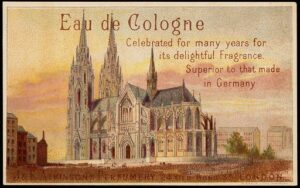Eau de Cologne: A Fragrance Classic
Eau de Cologne, often simply referred to as Cologne, is a classic and timeless type of fragrance that has been a staple in the world of perfumery for centuries. Its history is rich, and its distinct characteristics make it a unique and versatile choice for those who appreciate a fresh and invigorating scent. In this comprehensive exploration, we will delve into the origins, composition, applications, and enduring appeal of Eau de Cologne.

Origins and History:
The term “Eau de Cologne” is rooted in history and has a fascinating origin. It was first created in the early 18th century by an Italian perfumer named Giovanni Maria Farina, who was living in Cologne, Germany. In 1709, he crafted a fragrant water that he called “Eau de Cologne” or “Kölnisch Wasser” in German. Farina’s creation was inspired by the scents of citrus orchards in Italy, and he aimed to capture the essence of freshness, cleanliness, and vitality in a bottle.
Farina’s Eau de Cologne quickly gained popularity and was embraced by European nobility and the upper classes. It became a symbol of elegance and refinement, setting the stage for a fragrance tradition that endures to this day. The original recipe for Cologne has been passed down through generations, and various iterations and adaptations have emerged over the years, but the essence of the classic Cologne scent remains.
Composition:
Eau de Cologne is characterised by its simple yet effective composition, which distinguishes it from other fragrance types:
- Citrus Dominance: Citrus notes, particularly those of lemon, bergamot, and orange, are the defining elements of Cologne. These bright and uplifting scents provide the signature freshness that has made Cologne a beloved choice for centuries.
- Low Concentration of Fragrance Oils: It typically contains a lower concentration of aromatic compounds compared to other fragrance types like Eau de Parfum or Eau de Toilette. It typically ranges from 2% to 5% fragrance oils, which contributes to its light and refreshing character.
- Alcohol Base: Alcohol is often the primary base for Cologne. This not only serves as a carrier for the fragrance but also adds to the quick evaporation and refreshing feel on the skin.
- Simple and Linear: Unlike more complex fragrances that have distinct top, middle, and base notes, It often maintains a more straightforward and linear scent profile. This simplicity is part of its charm, as it exudes a consistent and invigorating fragrance from application to dry-down.
- Herb and Floral Accents: In addition to citrus, some Cologne variations incorporate herbal or floral notes such as lavender, rosemary, or neroli. These elements can add depth and complexity to the fragrance without compromising its refreshing nature.

Applications:
Eau de Cologne is a versatile and multi-faceted fragrance that can be enjoyed in various ways:
- Body Splash: Eau de Cologne can be generously splashed or lightly sprayed directly onto the skin. Its refreshing quality makes it an excellent choice for a post-shower splash to invigorate the senses.
- Hair and Clothing: Some individuals opt to apply Eau de Cologne to their hair or clothing to enjoy its scent throughout the day. Be cautious when applying it to clothing, as it may interact with fabric differently than it does with skin.
- Layering: Eau de Cologne can be used in combination with other fragranced products, such as body lotions or shower gels, to create a layered effect. This can enhance the overall experience and longevity of the scent.
- Rejuvenating Rituals: Eau de Cologne is sometimes used in aromatherapy and relaxation practices due to its revitalizing aroma. A few spritzes can serve as a pick-me-up throughout the day.
- Home Fragrance: Beyond personal use, some people use Eau de Cologne to scent their living spaces, either by adding a few drops to a diffuser or using it as a room spray.
Enduring Appeal:
Eau de Cologne’s enduring appeal lies in its timeless and universal qualities:
- Freshness: The hallmark of Eau de Cologne is its refreshing and revitalizing nature. It’s the ideal choice for those who seek a clean, crisp, and invigorating fragrance.
- Versatility: Eau de Cologne is versatile and suitable for a wide range of occasions. It can be worn casually during the day, at work, or in a relaxed setting. Its unobtrusive character makes it an excellent choice for individuals who prefer not to wear strong or overpowering scents.
- Historical Significance: Eau de Cologne holds a special place in the history of perfumery. It is a fragrance that has been cherished for centuries, evoking a sense of tradition, sophistication, and timelessness.
- Signature Citrus: The prominence of citrus notes, particularly in the form of lemon, bergamot, and orange, sets Eau de Cologne apart. These notes create an immediate sense of brightness and cleanliness, making it an iconic choice for individuals who appreciate a zestful start to their day.
- Iconic Brands: Several renowned fragrance houses have created their own versions of Eau de Cologne, adding a touch of exclusivity to this classic scent. These brands have maintained the integrity of the original while offering a diverse array of interpretations.
In conclusion, Eau de Cologne stands as a testament to the enduring power of simplicity and the ability of fragrance to transcend time and trends. Its fresh and invigorating qualities, rooted in history and enriched by numerous interpretations, continue to make it a beloved choice for those who appreciate a timeless and uplifting scent. Whether you’re drawn to the historical significance, the iconic citrus notes, or the versatility it offers, Eau de Cologne remains a classic and ever-relevant fragrance option.
